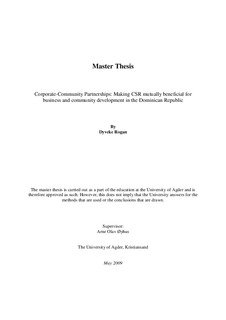| dc.description.abstract | This study explores the role of a corporate-community partnership in making Corporate
Social Responsibility (CSR) a mechanism that creates shared value for both business and
society. The investigation seeks to generate knowledge about how a partnership can ensure
“business benefits” in terms of satisfied CSR objectives for a company, as well as beneficial
outcomes in terms of development in the host-communities.
The concept of CSR has caused businesses world wide to pay increased attention to social and
environmental performance. For those companies operating in developing countries, these
responsibilities are frequently defined in terms of contributions to sustainable development
(WBCSD, 2009). While the corporate rationale and objectives for CSR have been firmly
identified by previous research, there are more uncertainties regarding CSR’s outcomes and
consequences for the beneficiaries of CSR initiatives in the host-society (Muthuri, 2008;
Blowfield, 2007). Some companies have therefore chosen to engage in partnerships in order
to contextually tailor their CSR interventions, improve corporate-community dialogue, and
ensure an appropriate response to local expectations about a company’s social and
environmental responsibilities (Davy, 2001; Idemudia, 2007).
The empirical investigation is based on a case study of Xstrata’s CSR strategy and the
partnership that has been established between Xstrata Nickel Falcondo, the Falcondo
Foundation and the local communities in the provinces of Monseñor Nouel and La Vega in
the Dominican Republic.
The corporate-community partnership has ensured gains for all actors involved. An improved
corporate-community relationship, enhanced legitimacy of the company’s actions, and
business opportunities are major benefits of the partnership for Xstrata. Simultaneously, hostcommunities
have obtained a channel of dialogue through which they can voice their
concerns, and they participate actively in development projects that are driven by the wishes
and challenges identified by the community-members themselves. Villagers now live under
improved socio-economic conditions, have acquired skills and capacities through collective
work with their fellow community-members, and social relationships have been strengthened;
a solid base for community empowerment and development.
The partnership’s ability to bridge demands for immediate results with a long-term
perspective of the development process, target structural impediments to community
development, and maintain an equilibrium of corporate and community power and interests,
have been critical factors in turning CSR into a mechanism that benefits both Xstrata and the
host-communities. The study thus demonstrates that the partnership’s recognition of the
interdependency of business and society for the growth of both, has led to a synergetic effect
where mutual advantages are obtained. | en |
